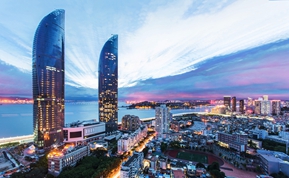E-commerce insiders seek to break barriers
Lightinthebox.com is a Beijing-headquartered retail website that sells and delivers products directly to consumers around the world. More than 90 percent of the company's revenue comes from overseas sales.
Lightinthebox Vice President Jiang Yong said the company has built warehouses overseas and hired locals for after-sale services.
"Customers around the world can easily buy high-quality, low-price products on our website," Jiang said.
"Chinese products are competitive, as the production costs in China are still well below Western levels," said Li Yansheng, senior vice president of Shenzhen 4PX Information Technology Co, Ltd, which specializes in helping foreign e-retailers set up platforms in China.
Moreover, China's middle class families have enough money to buy European-made products and luxuries, said Li, making e-commerce between China and the rest of the world profitable.
Challenges remain
Prospects for cross-border e-commerce may be bright, but insiders warned much should be done to tap the market's full potential.
Building a presence in foreign e-commerce markets typically requires trusted local partners for technical and logistics support.
"England is a small country, which means it is easier to move things around on the same day or next day. Obviously, in China it's more difficult given longer distances," Sims said.
Conference attendees said cross-border shipments require cooperation between the two countries' customs, tariff reductions and other preferential policies to help the industry thrive.
Phillips said tastes, preferences and buying habits vary among customers in China and the West, which means foreign companies must localize product offerings and marketing.
"But our view at the CBBC is that these challenges can be overcome," said Phillips. Cai is also confident, while his association begins training business professionals in cross-border e-commerce.
"The cake is big enough for domestic and foreign companies to share," he said.
Why Xiamen
-

Xiamen is one of the most economically competitive cities in China and was one of the first Special Economic Zones on the Chinese mainland. As a vice-provincial city independently listed on the State development plan, it has provincial-level authority in economic administration and local legislative power. In 2010, the Xiamen SEZ was expanded to cover the entire municipality. Today, Xiamen is a modern and international port city.
